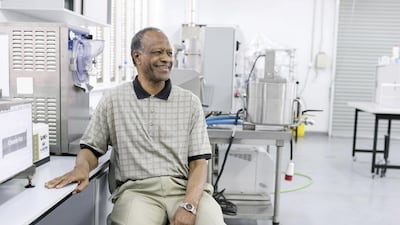AL AIN // Job interviews can come with pretty tough questions — but not if you’re looking to become an official ice-cream tester.
All the sweet-toothed wannabes had to do to land a place on the 100-strong panel was answer two simple questions: “Do you eat ice-cream? And if so, how often?”
Answer “yes” and “at least once a week” and the job, and all the ice-cream you can eat, was yours. And all in the name of scientific research, of course.
The taste test was organised by staff at United Arab Emirates University to gauge consumers’ reaction to date syrup ice-cream, which is not yet mass produced in the UAE, and whether they would be willing to buy it over traditionally sucrose -sweetened ice-cream.
Only those with a penchant for ice-cream were qualified to take part, said lead researcher Dr Isameldin Hashim, associate professor, department of food sciences, college of food systems at UAEU in Al Ain.
“Because if you don’t consume ice-cream you will not be able to judge if this ice-cream is good or not.”
Once the panel of 100 taste testers – mostly single, Emirati female undergraduate students from Fujairah and Ras Al Khaimah – were in place, the team got to work whipping up batches of ice-cream.
The ingredients included Al Ain Dairy fresh whole cow milk, Almarai cream, Anchor skimmed milk powder, sucrose for the control sample and Al Foah date syrup for the test batch.
Panelists were asked to assess the ice-cream’s appearance, colour, aroma, sweetness, flavour, texture and their overall acceptance of date syrup on a nine-point scale, from “dislike extremely” to “like extremely”.
Co-author Toga Abbas Omer Osman, who was a student when she worked on the research with Dr Hashim, said the date syrup ice-cream was tasty.
“For me, I liked it,” said Ms Osman. “I liked the aroma, the colour, the sweetness, flavour and the texture. All of them, I liked it.”
According to the report, the taste testers found the main difference between date and regular ice-cream was that the date had “significantly higher aroma ratings compared to the regular ice-cream” but overall “consumers liked date syrup ice-cream’s sensory properties.”
Although the two types of ice cream were rated similarly by the testers, Dr Hashim noted they contained different characteristics.
Date syrup ice-cream was naturally brown, similar to chocolate, and it had “a different sweetness” whereas sucrose ice-cream has to have flavouring and colour added.
“From a nutritional point of view, date syrup contains other nutrients. It will have some minerals, some antioxidants, it has some other components that are extracted from dates. So from a health point of view, it will add other nutrients, not just sugar, to make it sweet.”
When it came to the crux of the study – whether shoppers would buy date-sweetened ice-cream – the results were overwhelmingly positive, said Dr Eihab Mohamed Fathelrahman, assistant professor at the department of agribusiness and consumer sciences, College of Food and Agriculture.
Sixty-six per cent of the participants said they would be willing to buy date syrup ice-cream if it were available. Moreover, 41 per cent said they were willing to pay a premium of at least 33 per cent more than regular ice-cream, researchers found.
“The study has shown that there is a demand for it,” said Dr Fathelrahman.
While the research was “fun”, Dr Fathelrahman said the study was also a serious part of the university’s efforts to find more uses for local crops, such as dates.
“There is a lack of utilising the product efficiently and utilising all its by-products,” said Dr Fathelrahman.
“For example, we have people who are working on the seed of dates, we have people in the college who are working on the leaves, and this is one of the products that have not been noticed, have not been discovered, and then taking it to a further step to the market.
“This is what we do at the university – we uncover the opportunities for farmers.”
rpennington@thenational.ae

